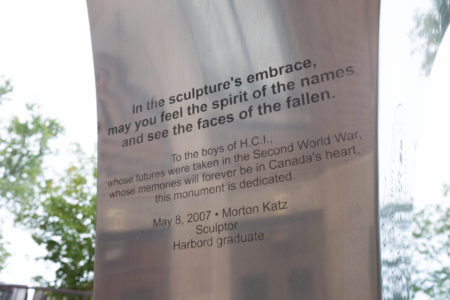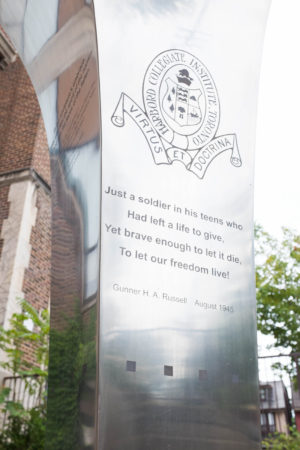Category: Toronto
Fields Institute 3/6
At the intersection of entitlement and slaughter
My current home in Toronto’s annex neighbourhood is a weird place and time in which to live. Many of the people up and down my street are simultaneously funding cosmetic renovations to their houses, like installing smooth new bricks and stairs. At the same time, there are people who I see daily and who seem to earn their living by picking liquor bottles out of the city’s big blue wheeled recycling bins.
It all makes me feel like people here don’t understand what is going on. The rich landowners are shelling out in hopes of boosted social status or because of psychological insecurity. At the same time, glass and metal containers which could be recycled just as well by the standard municipal recycling service are worth collecting and bringing to specific stores, at the same time as society largely ignores the harm associated with alcohol, and even encourages its use. In Canada, the four kinds of drugs that cause the most damage to individuals and society are alcohol, tobacco, opiates, and benzodiazepines. People who spend their labour collecting liquor vessels provide no benefit to society, since it doesn’t matter whether municipal recycling or Ontario’s liquor sales system collects the glass and aluminium. Within three blocks of here, restaurants burn methane to encourage customers to sit outside.
This is all magnified by my concern about climate change. All the credible science shows that continuing with business as usual will destroy nations, yet people continue to feel entitled to burn as much fossil fuel as they can afford. People find the flimsiest excuse to justify wasting energy on heating or cooling large spaces, flying thousands of kilometres in jets, and constantly adding to their stocks of material possessions. If there are people in the future, they will probably be right to judge us harshly: as the ones who knew the ruin they were imposing for their own fun and convenience and who chose like psychopaths to do it all anyway.
Fields Institute 2/6
Fields Institute 1/6
Harbord Collegiate Institute statue
Harbord Collegiate Institute WWII memorial 3/3
Harbord Collegiate Institute WWII memorial 2/3
Harbord Collegiate Institute WWII memorial 1/3
The AC dilemma
After many shorter spans which left us sweating in our third floor rooms, Toronto is now immersed in the longest and most intense heat wave of the summer so far.
This leaves me feeling awkward about actually owning an air conditioner, which I have never moved from its storage location in our living room. During my long search for accomodation, I saw many, many deeply unappealing, distant, and overly expensive rooms. When the chance to rent this one arose, I wanted to do everything possible to avoid somehow losing this one. So, when the previous inhabitant wanted to sell me his furniture (as well as most of the furniture in the common areas) I was willing to do so at the prices he initially suggested. That’s how I ended up with a $150 air conditioner which fits in my window but which I have never turned on.
My reluctance is entirely about the energy use and associated greenhouse gas emissions. Remarkably, in a city that goes below -20 ˚C in winter, Toronto’s highest energy demand is during hot summer days when everyone turns their air conditioning on. This isn’t so remarkable really, in part because cooling is fundamentally less efficient than heating. Turning electricity into heat is essentially a 100% efficient process. By contrast, refrigeration requires the inefficient compression of a coolant (producing heat as an unwanted by-product) which is then expanded in the area to be cooled and circulated elsewhere to be re-compressed and release the heat it has absorbed into the outside environment.
Perhaps worst of all is that when energy demand peaks, Ontario cannot produce enough electricity from low-carbon sources including large-scale hydroelectric and nuclear — instead turning on natural gas ‘peaker’ plants that would not otherwise run, like the Portlands Energy Centre.
Another oddity is that, for renters like us, electricity bills are paid by the landlord. Cooling would thus have no associated financial cost for me.
There are arguments in favour of me using AC. At the best of times, summers carry a danger of being inefficient doldrums. Without the structure asociated with teaching tutorials, regular meals at Massey, regular contact and communication with colleagues, and all the other motivating accompaniments of the school year, it can be easy to become unproductive. This is even more true when it is too hot to sleep, or even to sit in my room reading or doing research in a productive way.
I do have fairly easy access to cooled work areas at Massey College and Robarts Library, and that has been my chief means of escaping the heat.
This particular wave is meant to break over the next few days. I am greatly looking forward to the fall, which I think may be my favourite season in this part of the world. As in Ottawa, it provides an enjoyably span of pleasantly cooler and cooler days. Even the depth of winter is far preferable to mid-summer, in my eyes. I can always break out the wool long underwear, and wearing coats is often convenient for carrying things. By contrast, summer often leaves us with worsening the climate change plight of everyone in the future as our only means of avoiding the discomfort of heat and humidity right now.
As for the air conditioner, I can’t sell it because that would certainly lead to it being frequently used. Perhaps the best option is to find somewhere that can remove the coolant, since they are powerful greenhouse gases when they leak, and recycle as much of the rest of the device as possible.








